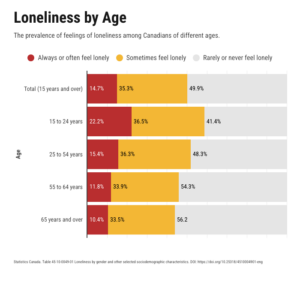
Vancouver company seeks to combat growing city loneliness
Vancouverites are creating meet-up events for more opportunities to socialize
By MAJENTA BRAUMBERGER
Feelings of loneliness are rising among Canadian youth, and Kousha Talebian and Zuki Majuqwana say they wanted to change things.
They created the online platform Common Ground with the goal of making in-person connections easier.
“There were a bunch of people across the city who were building community and running events in different ways, but it was really hard to find them, you kind of had to stumble across them on Instagram or someone had to refer you to them.” Majuqwana said.
Common Ground, founded in 2024, serves approximately 1,000 people each year. The Common Ground website allows event organizers to post their community events in Vancouver. Experiences posted on the site, including workshops and social gatherings, are aimed at fostering connection and support among participants and hosts. Many events are offered at no cost, with some requiring a ticket and fee.
Occasionally, Common Ground also hosts events themselves. On Sept. 29, they hosted a bike tour to four Vancouver breweries.
Consequences from lack of socialization
Olivia Randall, a young nurse working in Vancouver, found out that graduating from university during COVID-19 made connecting with people more challenging.
“I didn’t have those opportunities to get out and organically meet people,” she said.
Data from the Canadian Social Survey suggests that 15- to 24-year-olds are the loneliest age group in Canada. Between April and June of this year, 22.2 per cent reported feeling lonely often or always, while the average across all Canadians was only 14.7 per cent.

Building meaningful connections
By creating a central destination for social opportunities, the two founders hope Common Ground will foster community among its users.
“We’re trying to use the magic of connecting people through technology but doing it on a super local scale, whether it’s a university campus or a city, to make it easier to connect and find your people,” Majuqwana said.
Talebian said that the power of community is important. “We don’t want to just sell out your event, for us the focus is to bring the right people to your event.”
Both founders acknowledged the challenge of turning encounters at the events hosted on Common Ground into more meaningful relationships. The company uses technology to track participants who attend the same events to foster connections.
“For the attendees, we are keeping track of who sees who so that we make sure you will see the same person over and over again so that you kind of become their friends,” Talebian said.
Lenny Pallerstein, who attended Langara College, went to one of the meet-up events hosted on Common Ground’s platform. “This is mostly just me getting out of my comfort zone… in an intentional way,” he said.
Pallerstein believes that meet-up events can foster meaningful connections.
“It felt a lot more comfortable than I thought it would,” said Pallerstein.
Dr. Charles-Antoine Barbeau-Meunier speaks to how loneliness is affecting youth and how meaningful connections are necessary for the human experience.
Lack of socialization is causing mental distress
A decrease in meaningful in-person connections may be contributing to rising loneliness among Canadian youth, though the issue is linked to complex factors.
Research shows that after 2012 loneliness and mental health distress have doubled in adolescents.
This shift coincides with the widespread adoption of smartphones and social media. Face-to-face interactions have declined, with more relationships mediated through screens.
Toronto psychiatry resident Dr. Charles-Antoine Barbeau-Meunier has spent his career committed to specializing in empathy. He said that while social media allows users to connect with many people at once, those interactions often lack depth.
“These are the kind of connections that still leave us feeling hungry in a way, and people have referred to this as social snacking. It’s like you get social connection, but it’s like a snack. It’s empty calories at the end of the day,” Barbeau-Meunier said.
For young people, meaningful social connections are essential to building a sense of belonging and support and are linked to better mental well-being.
Harman Singh, a mental health ambassador with student services at Langara College, said spending face-to-face time with friends was key to helping him navigate feelings of loneliness.
“Every single hour that you spend is like heaven with your friends, especially when you’re in a down state,” Singh said.
Through his work, Singh speaks to members of the Langara community who need someone to talk to, fostering in-person interaction.

Comments are closed.